Part 2: Detailed results for schools
Preventing fraud
Having the right framework to prevent fraud means having a code of conduct and policies about fraud, protected disclosures, receiving gifts, and using credit cards. It means making it safe and easy for staff to talk about fraud and raise any concerns or suspicions. It also means having fraud controls that are reviewed regularly, carrying out due diligence checks of suppliers, and doing pre-employment screening.
Code of conduct and policies
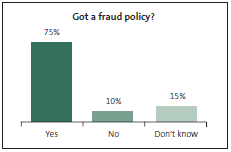
Three-quarters of respondents said that their school had a fraud policy, and 89% said that they had a code of conduct. For small schools, a specific fraud policy may seem excessive – what is most important is that clear guidance is accessible and understood by all staff.
Fewer respondents (41%) said that their school had a gift policy.
It is common for students and parents to occasionally give gifts to school staff at the end of the school year. Although these are unsolicited and usually declined if expensive, it is important that schools have a policy to provide guidance to employees in those situations. Without such a policy, there is a risk that inappropriate gifts might be accepted – which could damage the school's reputation.
We note that the Ministry of Education has model policies available for schools, which could be helpful for schools with any policy gaps in their fraud control frameworks.
Credit card spending
Although most respondents (79%) said their school took credit card spending seriously, this percentage was lower than for all public sector entities (83%). Most respondents (87%) said their school took expense claims seriously, and this finding was similar to all public sector respondents (86%).
Environment receptive to conversations about fraud
Most respondents (96%) said that their school was receptive to conversations about fraud – respondents felt they could safely raise any concerns and know that those concerns would be taken seriously. This was one of the highest results across the public sector. Most respondents (90%) also had confidence that their school would take proactive steps to reduce the risk of fraud if a fraud was discovered in their school.
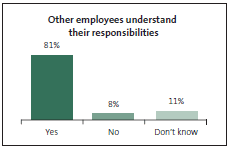
Similarly, most respondents (95%) said that they felt confident that managers in their schools understood their roles and responsibilities for preventing and detecting fraud. Again, this was one of the highest results across the public sector (89% for all public entities).
Preventing fraud is not the responsibility of any one person, and 81% of school respondents said other employees understood their responsibilities and would know what to do if they discovered fraud. Again, this result was one of the highest (the result for all public entities was 73%). In our view, all employees need to understand their roles and responsibilities so that a culture receptive to discussing fraud can be supported and maintained.
Due diligence checks and pre-employment screening
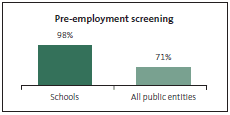
Many frauds occur through the use of fake suppliers and suppliers with a close personal relationship with an employee. Carrying out due diligence checks can help to mitigate the risk that suppliers can pose. Some examples of due diligence checks are:
- removing unused suppliers from the system;
- requesting references or credit checks; and
- regularly monitoring the changes to supplier details.
Only 43% of schools are currently completing checks like this. Awareness of these controls was varied – more than half of the operational staff did not know whether these checks happened in their school. This response rate was one of the lowest in the public sector.
Most often, it is trusted employees who commit fraud. Trusting employees is important, but to trust without first ensuring that it is appropriate to do so exposes schools to unnecessary risk.
Schools are performing well in this regard. Nearly all respondents (98%) said that their school carried out pre-employment checks that included a criminal history check. This positive response rate was notably higher than the rate for the public sector overall (71%).
Greater risk during tougher economic times
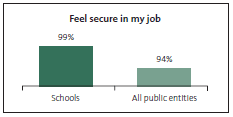
We note that 69% of all respondents did not feel that their entity had a change in risk because of the current economic climate. Experience internationally generally confirms that recessionary economic climates – when staff feel less secure in their employment and increasingly under pressure – present a greater fraud risk. Fraud increases because of "need" rather than "greed".
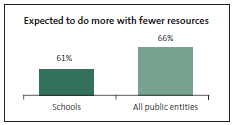
Schools are in a slightly more favourable position than other public entities. At the time of our survey, respondents in schools felt more secure in their employment than workers elsewhere in the public sector. However, we note that about two-thirds of school respondents reported feeling under pressure to "do more with less".
Questions 1 to 15 in Appendix 1 set out the survey response data about fraud prevention.
Detecting fraud
Although boards of trustees should be able to trust their employees to do the right thing, having trusted employees is not a fraud control. The likelihood of being discovered is often a strong deterrent for those contemplating wrongdoing, but controls and culture play a critical role in preventing and detecting fraud.
Fraud prevention is the first line of defence for schools. Schools were most likely to detect fraud through internal controls – 46% of the most recent fraud incidents were detected this way. This result was 10% higher than it was for the wider public sector, so the internal controls in some schools appear to be working well.
The percentage of school respondents who said that credit card spending was closely monitored (84%) was slightly lower than the percentage for all public entity respondents (90%). However, almost all school respondents (99%) said that staff expenses were closely monitored. The comparable figure for the public sector overall was slightly lower, at 97%.
Questions 16 to 22 in Appendix 1 set out the survey response data about fraud detection.
Responding to fraud
Reviewing internal controls
More than two-thirds (72%) of respondents said that internal controls were reviewed after a fraud had occurred in their school. In our view, boards of trustees should review their internal controls after every fraud, to ensure that controls are still appropriate. When a control weakness is identified, boards of trustees should strengthen the controls to prevent any repeated fraud and tell staff that the control has been strengthened.
Telling staff about incidents of fraud
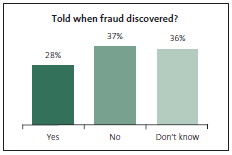
Most school respondents (96%) were confident that their board of trustees would take reasonable action to recover any money lost through fraudulent activity. This percentage was slightly higher than the result for the public sector overall (93%).
Less than a third of the school respondents said that their school leaders told all staff about incidents of fraud. Most either said that school leaders did not do this or were not sure whether they did.
Communicating with staff is vital in raising awareness about fraud. Greater awareness makes it easier for staff to be vigilant, can confirm the board of trustees' "zero tolerance" approach to fraud, and helps to maintain an environment where it is easy for staff to speak up about risks and raise any concerns.
Referring suspected fraud to the appropriate authorities
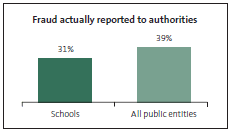
Most respondents (81%) expected that suspected fraud would be reported to the appropriate authorities. In reality, less than a third of the most recent incidents of fraud were reported to the appropriate authorities.
We know that boards of trustees are sometimes reluctant to bring criminal charges against their employees because of materiality – but also because of the time and costs of preparing a case, resolving matters in the courts, and a perception that fraud is a low priority for the Police.
However, all public sector entities are expected to consider reporting fraud to the appropriate authorities. We encourage all boards of trustees to do this.
Any decision made not to report or respond to fraud can erode staff confidence in the board of trustees and school leaders. It can create a perception that the board of trustees and school leaders are not committed enough to preventing fraud and discourage staff from reporting their concerns. Taking no action when fraudulent behaviour occurs also increases the risk that an employee suspected of committing fraud could move to another school and continue their dishonest behaviour.
Questions 23 to 31 in Appendix 1 set out the survey response data about fraud responses.
page top